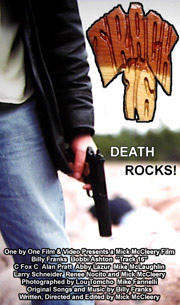

|
| home | movie reviews | features | sov horror | about | forum |
Track 16 D+
Year Released: 2001
In a warehouse studio, a popular local band called the Paul Matthews Network toils into the night, improving their sound. After the others call it quits, Paul lingers behind to perfect an extra vocal track. Hearing something peculiar during playback, he isolates the noise, and listens again. Muffled shouts echo behind his vocals -- was someone hurt while he sang? Skeptical but scared, Paul grabs a mic stand, opens the studio's back door... and discovers a woman crumpled in a pool of blood. I'll let the poster for Track 16 explain the rest: "But for the killer, one murder is not enough. Paul and his tape will have to be erased." Since Zapruder, movies have been fascinated with the power of accidental recordings, especially as an agent of betrayal. Perhaps because the oops capture of Kennedy's shooting so clearly justified cinema, filmmakers have often returned to the subject, in works as diverse as Antonioni's Blowup, Coppola's The Conversation and even television's America's Funniest Home Videos. Track 16 takes as its forebear one of the subgenre's strongest entries, Brian De Palma's Blow Out, itself a reworking of Antonioni's picture. Telling the story of a sound editor who becomes a political target after inadvertently taping a deadly car crash, De Palma injected Blow Out directly into the zeitgeist; it was a ticklish hallucination about Watergate, dirty officials, assassination, and a nation fixated upon electronic snooping. Unfortunately, Mick McCleery, the writer-director of Track 16, seems less interested in eavesdropping on a cultural mood than in crudely pilfering the macabre surfaces of films by De Palma, Tarantino, and Hitchcock. Allowing for the movie's miniscule budget, I can forgive its grainy visuals and substandard sound mixing, but I can't overlook how McCleery unspools an indifferent thriller involving a pokerfaced murderer (whose identity is telegraphed within minutes), gruesome one-liners, and thug detectives. Naturally, Paul (Billy Franks) is their prime suspect. As he is interrogated, he admits to a prior indiscretion that initially appears to have thematic relevance. Long ago he allowed himself to be recorded having sex, but when the girl erased the first 18 minutes of the tape, she was able to successfully charge Paul with rape. An 18-minute gap is of course significant, since it immediately references the Nixon tapes and their infamous missing minutes. This suggests a controlling idea about the devious role electronics play in our fate, but it is never expanded. In fact, McCleery hurries to collapse the story into an arbitrary series of cartoonish homicides, leading to a toneless, visually brittle gunfight, inexplicably set in a field of stones. (The movie fails to exploit the irony of stranding a rock singer in such a location.) Track 16 ends with the Paul Matthews Network -- what's left of it after the killing spree -- gaining radio play by incorporating track 16 in their released single, with the victim's screams included. Essentially, a woman's slaughter is reduced to an anecdote repeated by tactless disc jockeys. Matthews apparently never considered whether her family would mind that their daughter's brutal death is part of a radio hit, manipulated for commercial success. Since the movie doesn't bother to address that ethical question, it's fair to assume that McCleery never thought about it either. Like his main character, McCleery warps violence to his own advantage, employing it in a moral vacuum where "nifty" postmodern twists trump logic and general decency. De Palma employed similar nasty bits of humor in Blow Out, but his jokes were always fastened to his thesis; his pranks were wittier, and more than just callous surprises. There's one surprise in Track 16 worth recommending. Since Billy Franks has been an accomplished singer-songwriter for more than 10 years, the role of Paul may not have been much of a stretch. Still, his delivery is consistently natural, easily outclassing the film's other performers. (He provides a great moment after meeting a girl. While switching shirts, he uses the fresh one to wipe sweat from his chest before putting it on.) Notably, Franks contributes the picture's entire soundtrack, which is pleasantly loaded with lyrical, bluesy rock. Near the end he regretfully warbles, "My vision was wasted on you," and he might be serenading his director. Review published 04.07.2002. For another opinion, read Michael Scrutchin's review. For another opinion, read Jeremiah Kipp's review.
|

|
| home | movie reviews | features | sov horror | about | forum |
| This site was previously at flipsidemovies.com from 2000 to 2008. |
|
contact | copyright | privacy | links | sitemap
Flipside Movie Emporium (FlipsideArchive.com)
|